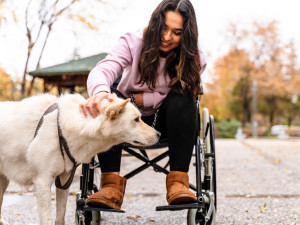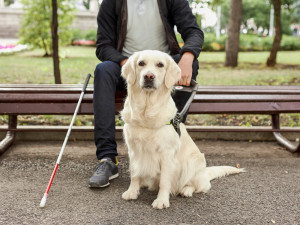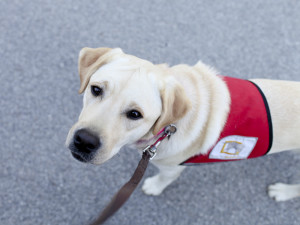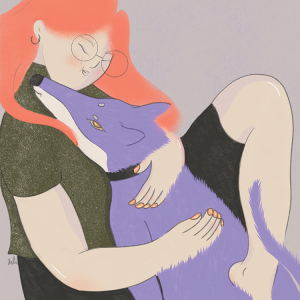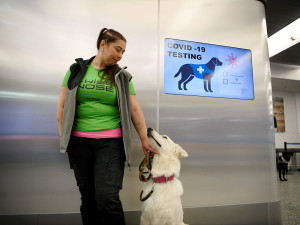What People Can and Can’t Ask You About Your Service Dog
The questions will come, so you should be prepared with answers.

share article
Service dogs can help people with a variety of conditions, from visual difficulties and hearing impairments to epilepsy, PTSDopens in a new tab, diabetes, and more. Once they’ve undergone their puppy service-dog training, your canine companion can accompany you almost anywhere. When you’re out in public with your service dog or applying for residency at an apartment building or somewhere similar, people will ask you questions about your service dog, but that doesn’t mean you have to answer all of them.
Under the Americans with Disabilities Actopens in a new tab (ADA), “state and local governments, businesses, and nonprofit organizations that serve the public generally must allow service animals to accompany people with disabilities in all areas of the facility where the public is allowed to go.” The ADA also states that when it is not obvious what service your animal provides, staff at public places are only allowed to ask you two questions: whether your dog is a service animal, and what work or task the dog has been trained to perform.
A couple of things to keep in mind: While there are websites that offer service animal registration for a variety of species, under the ADA, only dogs are recognized as service animals under the law. Keep in mind: Although some websites allow you to register your service dog online, there is no official database or registry of service dogs, so beware of scams sites offering a service dog license. Below, some more information about your rights with a service dog.
What is a service animal?
Under the ADA, service animals are defined as “dogs that are individually trained to do work or perform tasks for people with disabilities.” So, for instance, if you have diabetes, your diabetes service dog (also known as a diabetic alert dog, or DAD) is trained specifically to respond to symptoms of low blood sugar, such as fatigue or loss of consciousness, and to notify you and others.
A PTSD service dog might be trained to circle their parent in crowds to prevent them from feeling claustrophobic or to wake them from night terrors. In each of these cases, the training is specific and personalized to the person they serve.
What can people ask me about my service animal?
When entering a public space or business, staff members can only ask you whether your dog is a service animal and what work or task the dog has been trained to perform. They cannot ask you what your disability is or require medical documentation. So, for example, telling them that your dog is a service animal and that they are trained to remind you to take your medication or to help you retrieve items is all the information you are required to provide.
There are some restrictions on service dogs, though. First, they must always be under the control of their handler, who might use a harnessopens in a new tab, leash, or tether (unless that person’s condition prevents using these devices.) Second, a person with a service animal may be asked to leave the premises if their dog is out of control and they can’t control it or if the dog is not potty trainedopens in a new tab. If there is a legitimate reason for the service animal to be removed, the ADA states that “the staff must offer the person with the disability the opportunity to obtain goods or services without the animal’s presence.”
Is an emotional support animal a service dog?
An emotional support animal (ESA) does not qualify as a service animal under the ADA; though ESAs can be invaluable resources, they are not individually trained to work with disabled people. Any animal can become an ESA — no training required. (Just think about the news stories about ESA turkeysopens in a new tab and marmosetsopens in a new tab.) Because they do not qualify as service animals under the ADA, ESAs are not allowed the same protections and access as service dogs.
That being said, under the Fair Housing Actopens in a new tab (FHA), landlords may not refuse housing to people with disabilities or who require an ESA. They are allowed to ask for documentation or a letter from a mental health professional that confirms a tenant’s need for an ESA. Letters are optional for pet parents of a Psychiatric Service Dog (PSD), but a pet parent of a PSD can also request a letter from a licensed mental health professional if they wish.
How do I register my dog online?
There are countless service-dog registration scams online, so beware. As official as these sites may look, the U.S. government does not require official registration for service animals, so what a lot of these websites are doing is basically providing fake paperwork that looks legit. If a landlord or business owner asks for “official registration,” you can tell them no such thing exists.
If you would like to train your dog to be a working service dog, however, you can seek out a professional trainer who can train your dog to pass a certification test. You can also train them yourself to pass the Public Access Testopens in a new tab, the “unofficial standard” for service dogs. To pass this test, dogs must prove they can remain calm and focused in a variety of situations, including sitting on cueopens in a new tab, calmly unloading from a vehicle, and heeling while in a building.
Your service dog is an important part of your life, and you need to know your rights where they are concerned. Consult the ADA’s website and be aware of red flags from landlords, staff members at public places, and more. You can be your own advocate, but there are plenty of advocates who and resources that can support you, too.

Madeleine Aggeler
Madeleine Aggeler is a freelance journalist and copywriter in Washington, D.C. Previously, she was a writer at New York magazine’s The Cut. She lives with her dog, Cleo, who works primarily as a foot warmer.
Related articles
![A service dog for PTSD walking outside looking up at the camera]() opens in a new tab
opens in a new tabHow Service Dogs Can Ease Veterans’ PTSD
According to a study, trained service dogs can interrupt panic attacks, wake veterans from nightmares, and more.
![Illustration of a woman hugging a dog]() opens in a new tab
opens in a new tabYour Dog Can Smell When You’re Stressed, New Study Says
Research finds that your pup can smell when you’ve been doom-scrolling, and they get bummed out.
![Woman wearing a neon green t-shirt, black pants, and a grey vest gesturing to a white dog on a leash while standing in front of a sign on a metal wall that reads "COVID-19 Testing"]() opens in a new tab
opens in a new tabCOVID-19 Isn’t Going Anywhere. Enter Dogs Who Can Sniff It Out
The answer to every (seemingly never-ending) crisis: Dogs.
![Valentin Pujadas illustration]() opens in a new tab
opens in a new tabFYI, Pets Are Incredibly Good For Your Mental Health
This Mental Health Awareness Month, experts share the science-backed ways our pets offer us emotional support.
